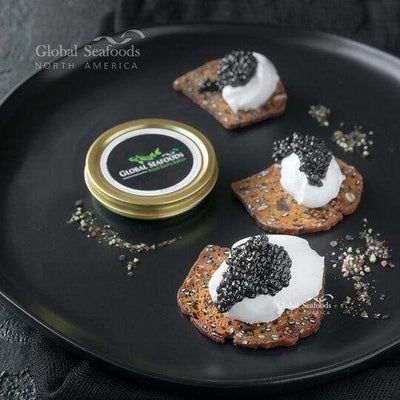Beluga Caviar: History, Benefits, and How to Find Authenticity

What Is Beluga Caviar?
Beluga caviar is the roe (eggs) of the beluga sturgeon (Huso huso), a species native to the Caspian and Black Sea basins. It is revered worldwide for its unparalleled quality, rich flavor, and luxurious status.
Characteristics of Beluga Caviar
- Size: The largest of all caviar types, with pearls measuring 3.5–4 mm.
- Color: Varies from light gray to jet black, with a stunning glossy finish.
- Flavor: Creamy, buttery, and mildly salty, with a delicate nuttiness that lingers.
Why Beluga Caviar Is the Pinnacle of Luxury
1. Rare and Exclusive
The beluga sturgeon is one of the oldest and most endangered fish species. Its slow maturation (up to 20 years) and limited population make its caviar incredibly rare.
2. Exquisite Taste
The delicate and refined flavor of beluga caviar is unmatched, often described as a sensory experience rather than just a taste.
3. Historical Prestige
Beluga caviar has been a status symbol for centuries, enjoyed by royalty and elites from Persia to modern Europe.
Quote from Experts:
“Beluga caviar represents the apex of culinary luxury—it’s more than food; it’s an experience,” says René Redzepi, chef of the world-renowned Noma restaurant.
Health Benefits of Beluga Caviar
Beluga caviar is not just a treat for your taste buds; it’s also packed with nutrients.
1. Omega-3 Fatty Acids
- Promotes heart health and reduces inflammation.
- Supports brain health and skin vitality.
2. Rich in Vitamins and Minerals
- Vitamin B12: Boosts energy and red blood cell production.
- Selenium: Antioxidant properties help combat oxidative stress.
- Iron and Magnesium: Vital for overall physical health.
3. High-Quality Protein
Provides essential amino acids, making it an excellent choice for muscle repair and overall wellness.
How to Identify Authentic Beluga Caviar
With its premium price, beluga caviar is often targeted by counterfeiters. Here’s how to ensure you’re buying the real thing:
1. Certifications and Labels
- CITES Certification: Verifies that the caviar is legally sourced and sustainable.
- Look for the species name (Huso huso) and harvest details on the packaging.
2. Appearance and Texture
- Genuine beluga caviar has large, glossy pearls with a firm texture.
- Fake caviar may appear dull or feel overly soft.
3. Flavor Profile
Authentic beluga caviar is buttery and mild, without an overpowering fishy taste.
4. Trusted Sellers
Purchase only from reputable suppliers like:
- Global Seafoods: Offers certified, sustainably farmed beluga caviar.
- Petrossian: Known for luxury and tradition.
How to Serve and Enjoy Beluga Caviar
1. Traditional Serving Style
- Serve chilled on crushed ice.
- Use a mother-of-pearl spoon to preserve the delicate flavor.
2. Pairing Recommendations
- Beverages: Pair with Champagne, dry white wine, or premium vodka.
- Accompaniments: Blinis, crème fraîche, and toast points complement the flavor without overpowering it.
3. Incorporate into Recipes
- Garnish pasta or risotto with a spoonful of caviar for an elevated touch.
- Enhance dishes like oysters, sushi, or eggs with caviar pearls.
Sustainability and Beluga Caviar
Due to overfishing, wild beluga sturgeon populations have declined drastically, leading to strict international regulations.
Farm-Raised Beluga Caviar
Modern aquaculture farms replicate the natural habitat of beluga sturgeon while adhering to strict environmental standards.
-
Benefits:
- Protects wild populations.
- Ensures consistent quality and flavor.
Supporting Ethical Choices
When purchasing beluga caviar, choose suppliers like Global Seafoods that prioritize sustainable farming practices.
Alternatives to Beluga Caviar
If beluga caviar is unavailable or beyond your budget, consider these premium alternatives:
1. Kaluga Caviar
Often called “river beluga,” Kaluga caviar offers a similar buttery flavor and large pearls.
2. Ossetra Caviar
Smaller grains with a nutty, robust flavor.
3. Sevruga Caviar
Smaller pearls and a saltier profile, perfect for adventurous palates.
FAQs About Beluga Caviar
1. Is beluga caviar legal in the US?
Yes, but only farm-raised beluga caviar is permitted due to conservation laws.
2. Can caviar be frozen for storage?
Freezing caviar is not recommended as it can affect the texture. Store in the coldest part of the refrigerator and consume within 3–5 days of opening.
3. What makes beluga caviar so expensive?
The long maturation period of beluga sturgeon (up to 20 years), coupled with its rarity and strict regulations, contributes to its high price.
Where to Buy the Best Beluga Caviar Online
For authentic, high-quality beluga caviar, trust these top suppliers:
- Global Seafoods: Ethically sourced and competitively priced.
- Petrossian: A legacy brand offering luxurious options.
- Marky’s Caviar: Directly sourced from sustainable farms.
Conclusion: Experience the Pinnacle of Luxury with Beluga Caviar
Beluga caviar is more than just a delicacy—it’s a symbol of refinement, luxury, and unparalleled flavor. By following this guide, you can ensure you’re purchasing authentic, sustainable caviar and enjoying it to its fullest potential.
Ready to indulge? Shop premium beluga caviar at Global Seafoods and elevate your dining experience today.
Watch More Caviar Tips and Recipes
Visit the Global Seafoods YouTube Channel for tutorials, recipes, and insights into the world of luxury seafood.
Also in News

How to Make Sea Bream Sushi With Dry-Aged Tuna & Crab Roll — Step-by-Step With Chef Joshua
A complete guide to making Sea Bream sushi at home, including filleting, curing, slicing, and building a Dry-Aged Tuna & Crab sushi roll. Chef Joshua shares professional tips for restaurant-quality results.

Boiled Crab for Game Night: Everything You Need for a Perfect Seafood Party
Take your game night to the next level with a Boiled crab party. Learn the best recipes, cooking tips, and hosting hacks for a memorable seafood feast.

Boiled Crab for Date Night: A Romantic Guide to the Perfect Seafood Feast
Make your next date night unforgettable with a romantic Boiled crab experience. This guide covers everything you need to know, from ambiance to the best crab varieties.

